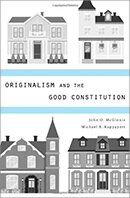Originalism, which has become the most prominent theory of constitutional interpretation, holds that the U.S. Constitution should be interpreted according to its meaning at the time it was enacted. In a new book that offers an innovative defense of that theory, John McGinnis and Michael Rappaport maintain that the text of the Constitution should be followed because it was enacted by supermajorities—both its original enactment and in subsequent amendments. A text approved by supermajorities has special value in a democracy because it has unusually wide support and thus tends to maximize the welfare of the greatest number. But what is originalism’s place in constitutional interpretation when the Supreme Court has created so much non-originalist precedent? Indeed, had the Court not interpreted the Constitution so freely, perhaps the nation would have resorted to the Article V amendment process more often and with greater effect. Please join us for a spirited discussion of Originalism and the Good Constitution and what this new defense of originalism means to the quest for constitutionally limited government.

